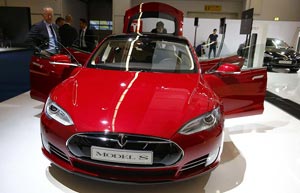Swiss-Swedish engineering group ABB, which has a footprint in more than 100 cities in China, is preparing to double that number over the next three years, especially in the country's central and western regions after good sales in 2013.
Ulrich Spiesshofer, chief executive officer of ABB Group, said the company will have 20,000 people working in China soon. He added there are many growth drivers such as energy-efficient technologies and infrastructure in the Chinese economy.
"We are making changes to carry out a strong penetration strategy to go west in China, to add additional cities, to go more into second-, third- and fourth-tier cities over the coming years," Spiesshofer said.
He added the opportunities the company sees arise from China's urbanization. China is emphasizing quality urban development, as well as "electric vehicles and building a high-efficiency grid network.
"If we look at the speed of urban development here in China, the way that the regulatory environment and the infrastructure development come together is remarkable and unique," Spiesshofer said.
The CEO added the consequences of the planning and perseverance that the central and local governments show in building prospering cities is something that is so strong that some other parts of the world can learn from it.
The populations of many of China's second-and third-tier cities are a lot bigger than other major cities in the world. Building ultra-high voltage power transmission networks and developing new-energy vehicle projects, as well as providing more industrial robots, are useful ways of keeping up with the process of urbanization and optimizing the nation's manufacturing structure.
Because of the boom in China's industrial upgrading, both orders and revenue of ABB China reached $5.6 billion in 2013. Its revenue rose 7.7 percent from the previous year. The company invested $136 million in the country last year. Its cumulative China investment has reached $1.8 billion.
Eager to carry out further economic transformation and industrial upgrading, many Chinese cities and enterprises have been eager to seek solutions and tackle problems caused by heavy automobile use and air pollution.
|
 |
